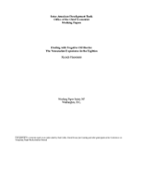Dealing with Negative Oil Shocks: The Venezuelan Experience in the Eighties
Date
Jan 1997
The Venezuelan experience in the 1980s is a particularly fertile ground for the analysis of negative shocks. Two large shocks took place under very different control regimes, thus highlighting the role the institutional setting plays in determining the response. Moreover, the experience can shed a different light into the convenience of alternative exchange rate regimes for countries subject to large and frequent trade shocks. In addition, the analysis can be simplified for two reasons. First, oil shocks only have direct effects on the public sector, thus implying that it is the policy reaction to the shock that will affect households and firms. Secondly, the supply response of the oil industry is not of macroeconomic interest.



